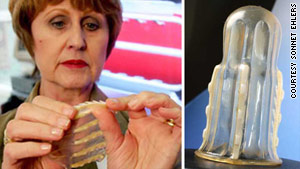
In Waisbord’s, Family Tree of Theories,
Methodologies and Strategies in Development Communication, he addresses deficiencies
in the health promotion model. Waisbord claims, “Individual-centered health
promotion ignores the surrounding social context (poverty, racism) in which individual
health behaviors take place as well as the fact that certain unhealthy
behaviors are more likely to be found among certain groups”. This statement
brings to mind a current device being used in South Africa, by NGOs such as
Planned Parenthood, Dr. Sonnet Ehlers Rape-aXe. The Rape-aXe is a latex female condom
that is inserted into the vagina like a tampon. Jagged rows of teeth-like hooks
line the inside and attach onto a man’s penis during penetration. Once it is lodged only doctor can remove
it. Additionally, it hurts the man to pee
and walk when it is on, albeit the condom does not break skin.
Dr. Ehlers
invention is lauded over by female advocate groups and women’s health
organizations. Planned Parenthood has been very active in its dissemination throughout
Africa. However, the Rape-aXe is not without its critics. Many worry that the
condom will increase violence against rape victims and put them in more danger.
Nonetheless the most formidable argument against its use is the increase in individual
responsibility against rape for women. A
woman most first perceive herself as vulnerable enough to rape to wear the
condom and secondly endure the act of rape in hopes that the current system in place
will punish the assailant accordingly. Rape-aXe
places it’s focus on helping the individual rather than addressing bigger issue;
the current social context of South Africa that perpetuates such behavior.
South Africa
has the highest instances of rates of rape in the world, with 28% of men claiming
to have raped a woman. To bring about true change for women in South Africa,
advocates need to focus on the culture and communication of the country. Social
activist should further examine and seek out options that do not circumvent the
situation, but work to alleviate the crisis.
So many feelings. First I'd like to say I fully support the shark condom. Second, I'd like to agree that scary shark condom will not prevent the bigger issue of rape: it will only help individuals by increasing their chances of surviving a rape and getting their rapist to stop. Solving the bigger issue of rape in general can only be mitigated by comprehensive education mechanisms and in a society that is still patriarchal to a high degree, women must do what they can to protect themselves.
ReplyDeletealthough waisbord is right in saying that helping the individual won't solve the greater crisis, the creators of this new condom aren't merely handing out condoms for safe sex: their giving women a tool to protect themselves. criticizing the shark condom is like saying, "well it's not gonna stop men from wanting to rape women anyway, so why not just let the men rape 'em without getting their penis bit?!"